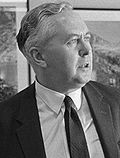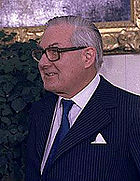
Labour Party (UK) leadership election, 1963
Encyclopedia


Hugh Gaitskell
Hugh Todd Naylor Gaitskell CBE was a British Labour politician, who held Cabinet office in Clement Attlee's governments, and was the Leader of the Labour Party and Leader of the Opposition from 1955, until his death in 1963.-Early life:He was born in Kensington, London, the third and youngest...
, the party leader since 1955. He had died on 18 January 1963 and was succeeded (on a temporary basis) by the deputy leader George Brown
George Brown, Baron George-Brown
George Alfred Brown, Baron George-Brown, PC was a British Labour politician, who served as the Deputy Leader of the Labour Party from 1960 to 1970, and served in a number of positions in the Cabinet, most notably as Foreign Secretary, in the Labour Government of the 1960s...
.
In 1963 the Labour leader was elected by the Parliamentary Labour Party
Parliamentary Labour Party
In UK politics, the Parliamentary Labour Party is the parliamentary party of the Labour Party in Parliament: Labour MPs as a collective body....
(the members of the House of Commons in receipt of the Labour whip
Whip (politics)
A whip is an official in a political party whose primary purpose is to ensure party discipline in a legislature. Whips are a party's "enforcers", who typically offer inducements and threaten punishments for party members to ensure that they vote according to the official party policy...
). To be elected the winning candidate required more than half the votes. If no candidate was elected in a ballot then the last placed candidate was eliminated and a new ballot held contested by the continuing candidates. This process, known as the exhaustive ballot, was repeated until a candidate was elected.
Candidates
Three candidates were nominated.- Deputy leader since 1960, George BrownGeorge Brown, Baron George-BrownGeorge Alfred Brown, Baron George-Brown, PC was a British Labour politician, who served as the Deputy Leader of the Labour Party from 1960 to 1970, and served in a number of positions in the Cabinet, most notably as Foreign Secretary, in the Labour Government of the 1960s...
(born 1914), was the MP for the DerbyshireDerbyshireDerbyshire is a county in the East Midlands of England. A substantial portion of the Peak District National Park lies within Derbyshire. The northern part of Derbyshire overlaps with the Pennines, a famous chain of hills and mountains. The county contains within its boundary of approx...
constituency of BelperBelper (UK Parliament constituency)Belper is a former constituency in the UK Parliament. It was created at the 1918 general election as a county division of Derbyshire, comprising the area in the centre of the county and surrounding Derby, and named after the market town of Belper although this was in the north of the constituency....
from 1945. Brown was popular in the party and stood for the continuation of Gaitskell's policies, but his colleagues were well aware of his propensity to drink excessive amounts of alcohol and behave in an erratic manner. Brown had been a junior minister before 1951. - James CallaghanJames CallaghanLeonard James Callaghan, Baron Callaghan of Cardiff, KG, PC , was a British Labour politician, who was Prime Minister of the United Kingdom from 1976 to 1979 and Leader of the Labour Party from 1976 to 1980...
(born 1912), an Englishman who had represented part of the Welsh city of Cardiff since 1945, was a well regarded frontbencher. He sat for Cardiff South EastCardiff South East (UK Parliament constituency)Cardiff South East was a parliamentary constituency in Cardiff, Wales. It returned one Member of Parliament to the House of Commons of the Parliament of the United Kingdom....
in 1963. Callaghan had been a junior minister before 1951. Callaghan was also a GaitskelliteGaitskellismGaitskellism was the ideology of a faction of the British Labour Party. Led by Hugh Gaitskell, Gaitskellites represented the political right of the Labour Party and were opposed by the Bevanites, a more Leftist faction of the party led by Aneurin Bevan...
and his campaign split the vote of the right wing of the party. - A former Bevanite, Harold WilsonHarold WilsonJames Harold Wilson, Baron Wilson of Rievaulx, KG, OBE, FRS, FSS, PC was a British Labour Member of Parliament, Leader of the Labour Party. He was twice Prime Minister of the United Kingdom during the 1960s and 1970s, winning four general elections, including a minority government after the...
(born 1916), had been the MP for the LancashireLancashireLancashire is a non-metropolitan county of historic origin in the North West of England. It takes its name from the city of Lancaster, and is sometimes known as the County of Lancaster. Although Lancaster is still considered to be the county town, Lancashire County Council is based in Preston...
constituencies of OrmskirkOrmskirk (UK Parliament constituency)Ormskirk was a county constituency represented in the House of Commons of the Parliament of the United Kingdom. It elected one Member of Parliament by the first past the post system of election. It was created by the Redistribution of Seats Act 1885 as a division of the parliamentary county of...
1945-1950 and of HuytonHuyton (UK Parliament constituency)Huyton was a county constituency in the United Kingdom. Created in 1950, it was centred on Huyton in North West England. Its one and only Member of Parliament throughout its existence was Labour MP Harold Wilson, who served as prime minister from 1964 to 1970 and again from 1974 to 1976.The...
since 1950. He had resigned from the cabinet of Clement AttleeClement AttleeClement Richard Attlee, 1st Earl Attlee, KG, OM, CH, PC, FRS was a British Labour politician who served as the Prime Minister of the United Kingdom from 1945 to 1951, and as the Leader of the Labour Party from 1935 to 1955...
in 1951 on the issue of prescription charges in the National Health ServiceNational Health ServiceThe National Health Service is the shared name of three of the four publicly funded healthcare systems in the United Kingdom. They provide a comprehensive range of health services, the vast majority of which are free at the point of use to residents of the United Kingdom...
. Wilson was the most credible alternative leader for the left, so he was persuaded to seek the party leadership in a 1960 challenge to Hugh Gaitskell. In that election he received 81 votes (35.37%). He was the only one of the three leadership candidates with cabinet experience.
Ballots
An overall majority was required for election. The results of the ballots of Labour MPs were as follows:| 1st Ballot: 7 February 1963 | |||
|---|---|---|---|
| Candidate | Votes | % | |
| Harold Wilson | 115 | 47.13 | |
| George Brown | 88 | 36.07 | |
| James Callaghan | 41 | 16.80 | |
| Majority | 27 | 11.07 | |
| Turnout | 244 | ||
| Second Ballot required; Callaghan eliminated | |||
| 2nd Ballot: 14 February 1963 | |||
|---|---|---|---|
| Candidate | Votes | % | |
| Harold Wilson | 144 | 58.30 | |
| George Brown | 103 | 41.70 | |
| Majority | 41 | 16.60 | |
| Turnout | 247 | ||
| Wilson elected | |||

